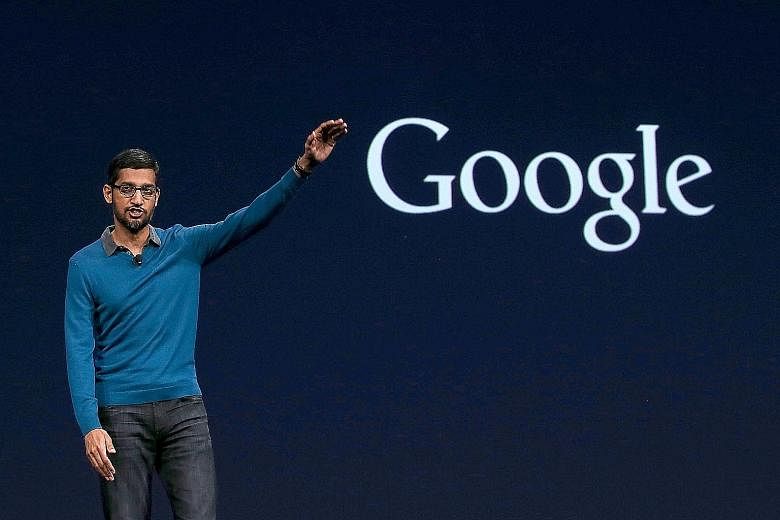Nice guys do come out on top. Mr Sundar Pichai, the new chief executive of Google, is proof of that.
From being a product manager working on Google's search bar just 11 years ago, the India-born 43-year-old has become the head honcho of one of the highest-grossing businesses in the United States.
Reports have described him as empathetic, affable and a team-builder, able to navigate political minefields both outside and within the company.
In a blog post announcing Google's restructuring last Monday, Google co-founder Larry Page passed the baton of chief executive to Mr Pichai, saying: "Sundar has been saying the things I would have said (and sometimes better!) for quite some time now, and I've been tremendously enjoying our work together... Sergey (Brin, co-founder of Google) and I have been super excited about his progress and dedication to the company."
Mr Page will focus on running Google's newly formed parent company called Alphabet.
Mr Pichai rose to his powerful new post from humble beginnings. Born in Chennai, he lived with his family of four in a two-room apartment, where he and his younger brother slept in the living room.
His mother was a stenographer and his father an electrical engineer, who managed a factory that made electrical components.
Ironically, for someone who has been labelled "the most powerful man in mobile" after he took over the running of Android in 2013, Mr Pichai's family never even had a phone till he was about 12 years old.
The family phone not only revealed to him the wonders of technology, but also unlocked Mr Pichai's special talent for remembering numbers.
He told Bloomberg Businessweek last year that he could recall numbers he had dialled on behalf of other family members, and this talent has also been displayed at meetings when he rattles off statistics.
Needless to say, Mr Pichai excelled academically. He studied engineering at the highly competitive Indian Institute of Technology in Kharagpur.
Later he was awarded a scholarship to Stanford University to study materials science and semiconductor physics. But to get there, Mr Pichai's father had to dig into his savings to produce US$1,000 (S$1,400) for the air ticket and other expenses - no small sum for the family. In fact, it was more than a year of his father's earnings.
"They sacrificed a lot of their life and used a lot of their disposable income to make sure their children were educated," said Mr Pichai.
Although he originally planned to become an academic, he dropped out of Stanford after completing his master's to work as an engineer and product manager in a semiconductor company. He later pursued a Master of Business Administration from the Wharton School of Business and then became a consultant at McKinsey before taking on his first role at Google in 2004.
Even in the first years of his career there, he was able to shine. Mr Pichai proposed that Google build its own browser - an idea supported by Google co-founders Page and Brin.
In September 2008, Mr Pichai oversaw the successful launch of the Chrome Web browser, which now holds about 27 per cent of the desktop browser market share, according to data analytics company Net Applications; it beat other browsers such as Firefox and Apple's Safari, and is second only to Microsoft Internet Explorer with about 53 per cent market share.
He was also involved in the development of the Web-based Chrome operating systems for laptops, which stores data in the cloud instead of on a device.
Reports state that although Mr Pichai found himself at odds with Mr Andy Rubin, the creator of the Android mobile operating system, Mr Pichai never let the situation get out of hand.
Mr Rubin, who created his own Web browser instead of using Chrome, ultimately stepped down as head of the Android team in 2013. Mr Pichai got the job.
"Sundar has a tremendous ability to see what's ahead and mobilise teams around the super important stuff," Mr Page wrote in October last year, when announcing Mr Pichai's further promotion to head most Google product areas, including maps, search and advertising.
But not all Mr Pichai's projects have been successful.
His bid to use the Android operating system in devices such as smart watches and smart TV sets has yet to gain widespread user traction, while there has been only a lukewarm reaction to low-end Android smartphones in emerging markets.
Upping his profile in the last two years - probably in preparation for his rise to chief executive - Mr Pichai has stepped forward as the public face of Google.
He has been the master of ceremony for Google's annual developer conference, where new products are unveiled, and made a significant shift by introducing the new Android operating system during the conference, instead of later in the year as it is traditionally done.
"I want the world to understand what we are doing sooner," Mr Pichai told Bloomberg Businessweek.
While his non-confrontational approach seems to have worked for him so far, he will now have to make more tough decisions as the head of a multibillion-dollar tech giant.
Some of the challenges include the rise of mobile phones and the use of apps, which means users spend more time in an app and less time searching and surfing.
Meanwhile, the company continues to vie with Facebook for advertiser dollars.
But at least for now, the head Googler seems to have the support and respect of his colleagues.
In the Businessweek report, Mr Caesar Sengupta, a vice-president who has worked with Mr Pichai for eight years, said: "I would challenge you to find anyone at Google who doesn't like Sundar or who thinks Sundar is a jerk."

